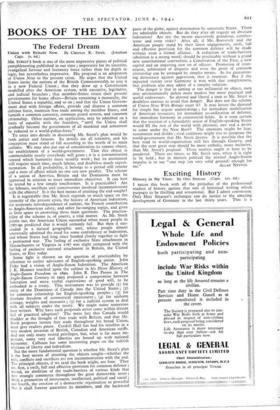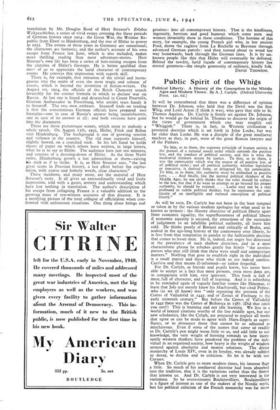Exciting History
History in My Time. By Otto Strasser. (Cape. los. 6d.) I BEGAN this book with all the prejudice of the professional student of history against that sort of historical writing which purports to be thrilling and sensational. But I admit conversion. Only Herr Strasser's technique can do justice to the amazing development of Germany in the last thirty years. This is a
translation by Mr. Douglas Reed of Herr Strasser's Erlebte Weltgeschichte, a series of vivid essays covering the three periods of German history since 1914: the Great War, the Weimar Re- public from Ebert to Hindenburg, and the rise of Hitler to power in 1933. The events of these years in Germany are sensational; the characters are fantastic; and the author's account of his own escape from France last June, which is also included, makes more thrilling reading than most adventure-stories. Herr Strasser's own life has been a series of hair-raising escapes from the clutches of Hitler's Gestapo. He is better qualified than mos- of us to appreciate the lurid character of contemporary events. He conveys this impression with superb skill.
There is, for example, that intrusion of the trivial and incon- gruous into the midst of even the most tragic and solemn of events, which is beyond the invention of fiction-writers. On August 1st, 1914, the officials of the Reich Chancery search feverishly for the correct formula in which to declare war on Russia. At last one is found and despatched to Count Pourtales, German Ambassador in Petersburg, who amidst tears hands it to Sasanoff. The two men embrace. Sasanoff finds on reading it that the conscientious German officials have prepared two formulae—one in case of Russia's answer being unsatisfactory, one in case of no answer at all : and both versions have gone into the document.
There are those picturesque scenes, which seem to embody a whole epoch. On August 13th, 1932, Hitler, Frick and Rehm visit Hindenburg. The background is one of growing tension and violence in the country. The old man supports himself, slightly bowed, on a crutched stick. In his left hand he holds sheets of paper on which others have written, in large letters, what he is to say to Hitler. The audience lasts just ten minutes, and consists of a dressing-down of Hitler. As the three Nazis retire, Hindenburg growls a last admonition at them—raising his stick as if to strike. It is, as Herr Strasser says, " the last great scene in Prussian history, a last effort before the capitu- lation, with coarse and homely words, clear characters."
These incidents, and many more, are the material of Herr Strasser's story. It all gives an extraordinarily vivid and lively impression, told with a gusto, artistry and understanding which have lost nothing in translation. The author's description of his escape from collapsing France is a valuable addition to the growing mass of eye-witness accounts of that disaster. It is a terrifying picture of the total collapse of officialdom when con- fronted with unforeseen situations. One thing alone brings real greatnes: into all contemporary history. That is the kindliness, ingenuity, heroism and good humour which some men and women invariably show in these conditions. The heroine of this story, for example, the young French girl who, in her ancient Ford, drove the tugitive from La Rochelle to Bayonne through advanced German patrols : and then turned about to wend her way homewards, back through the German lines. It is by un- known people like this that Hitler will eventually be defeated. Behind the tawdry, lurid facade of contemporary history lies eternal greatness—the simple generosity of ordinary, kindly folk.
DAVID THOMSON.



























 Previous page
Previous page